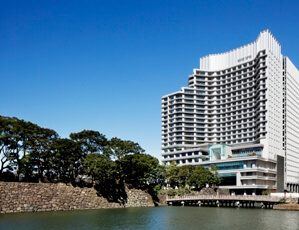TOKYO – Tokyo usually doesn’t conjure thoughts of tranquillity and resplendent natural settings, but the new Palace Hotel Tokyo debuted earlier this year as a bounty of refreshing contrasts – bridging the megacity’s reputation as an adrenaline-fuelled business hub with the serenity of the country’s much loved Imperial Palace gardens.
Opened in May, Japan’s most ambitious new hotel has been garnering recognition from some of Asia’s most distinguished arbiters of style, a trend that’s gathering momentum worldwide as its design attributes and indigenous appeal asserts itself on foreign shores.
In October, the hotel landed a spot on Destinasian’s ‘Luxe List’, a selective compilation of Asia’s most notable new hotels and resorts. The hotel was recognised that same month at HICAP – the most prestigious Hotel Investment Conference in Asia Pacific – with an award for ‘Development of the Year’, overtaking leading contenders in the region operated by international brands.
With a history that spans over 51 years in the same location, creating the entirely new Palace Hotel Tokyo called for an intermingling of culture and design that would seamlessly meld its long tradition of distinguished Japanese hospitality with contemporary aesthetics.
The overarching concept was to build a hotel with presence – one that would complement the beauty of its natural surroundings and the uniqueness of the country’s heritage and do so with grace and elegance.
“It was never meant to just be another addition to Tokyo’s skyline or simply the latest entry into the city’s luxury scene,” said Masaru Watanabe, the hotel’s Executive Director and General Manager. “We wanted to build a hotel where real substance and presence could be felt in the spaces created and the services offered. It’s about the authenticity in one’s experience when one stays at Palace Hotel Tokyo – because it represents the best of Japan.”
Half a dozen design firms were called upon to form the dynamic collaboration that brought to life the originality envisioned:
• Mitsubishi Jisho Sekkei Inc. designed the mixed-use development’s weighty architecture
• GA Design International dreamed up the lofty lobby level public spaces and dining outlets (including The Palace Lounge, Royal Bar and Grand Kitchen), the guestrooms as well as Amber Palace.
• A.N.D. (Aoyama Nomura Design) imagined the hotel’s signature Japanese restaurant Wadakura as well as its in-house wedding chapel, winner of the 2012 DFA (Design For Asia) Grand Award and DFA Gold Award.
• Design Post Inc. worked up the concepts for the hotel’s French fine dining restaurant Crown, Lounge Bar Privé and also its Shinto shrine.
• MEC Design International collaborated with GA Design International on evian SPA TOKYO, the swimming pool and fitness centre, and also the meeting spaces.
• Even spaces within larger spaces were driven by an uncompromising attention to detail, with GJF (Global Japanese Food) having designed the outpost for Sushi Kanesaka within Wadakura.
Natural & Cultural Connections
Poised at 1-1-1 Marunouchi just opposite the ancient Otemon Gate of Edo Castle, the hotel was purposefully designed to showcase Tokyo’s most inviting green space and the skyline that surrounds. With all of its guestrooms featuring views of the Imperial Palace gardens and moats, the hotel leverages its imitable location, yet with unassuming presence.
In a city as dense as Tokyo, the challenge was to create spaces from which the busyness of the city is inevitably visible in the distance, but not heard. Spaces which – through emphasis on heightening the five senses – exude the richness of Japanese culture and tradition, yet allude to their roots with a subtlety that only Japanese aesthetics could convey.
Natural motifs – from the tracery of trees on the walls of Bar Lounge Privé and its leaf-shaped bar to the hotel’s hand-tufted, deep green carpets – echo the connection to nature. The deliberate weaving of greenery and water to create an artistic tapestry of the changing seasons to be enjoyed from within is most noticeably reflected in the tamukeyama momiji Japanese maple purposely planted outside one of the lobby seating areas.
At the hotel’s signature Japanese restaurant Wadakura, a team of local artisans were brought together to skilfully combine traditional Japanese techniques and building materials with contemporary artistic interpretation to showcase new possibilities in craftsmanship.
Less subtle than these cultural connections is the hotel’s vast array of artwork, spotlighting the talents of some of Japan’s finest contemporary artists and showcasing the country’s rich artistic heritage throughout. Several of the approximate 1,000 paintings, watercolours, glass, metalwork and other pieces were commissioned specifically for Palace Hotel Tokyo and took inspiration from its scenic setting.
Residential Connections
To complement Palace Hotel Tokyo’s proximity to the gardens, GA Design International imagined the enveloping spaces of the hotel as a grand residence. On the lobby level, the concept manifests itself in The Palace Lounge’s lofty ‘living room’ and contemporary tea house, as well as in Grand Kitchen’s open-style kitchen.
A large fireplace commands the Palace Lounge while opposite, a white Steinway and bespoke six-meter-high shelving detailed with Macassar ebony trim lend to the luxurious sense of home.
“The aim was to not only make the hotel’s interiors attractive, but to also give them substance and meaning – an enduring character that would evolve over time and become very personal to those who pass through it,” said Terry McGinnity, Managing Director of GA Design International.



